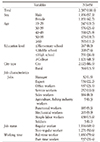Abstract
Objectives
The purpose of this study was to identify the effect of job characteristics and non-regular work on the toothbrushing habit and oral check-up in Korean worker.
Methods
This study was approved for the use of raw data from the 7th Korea National Health and Nutrition Examination Survey (KAHANES, 2016). The raw data was analyzed by complex sampling analysis using IBM SPSS Statistics 21.0 (Chicago, IL, USA). Statistical significance was determined as P<0.05.
Results
The non-regular workers had lower rate of toothbrushing more than twice a day, toothbrushing after lunch, and oral check-up than regular workers. Compared to non-regular workers, the odds ratio of toothbrushing and oral check-up at regular workers increased by 1,464 and 1,717 times, respectively.
Figures and Tables
References
1. Statistics Korea. Korea Statistical Information System (KOSIS), Statistics DB, Employment [Internet]. cited 2018 Oct 11. Available from: http://kosis.kr/statisticsList/statisticsList_01List.jsp?vwcd=MT_ZTITLE&parentId=B#SubCont.
2. Chang KW, Hwang YS, Kim JB, Song YS, Paik DI, Choi BK, et al. Oral health education. 4th ed. Seoul: Komoonsa;2010. p. 3–19.
3. Jung SH. New Public Health. 1st ed. Seoul: Komoonsa;2012. p. 191–229.
4. Park JH, Yoon HS. Subjective awareness and the quality of life related to oral health in industrial workers. J Dent Hyg Sci. 2012; 12:235–243.
5. Lee DI, Han SJ. Factors which affect the oral health-related quality of life of workers. J Dent Hyg Sci. 2013; 13:480–486.
6. Yoon HS. Relationship of oral health behavior to happiness indexes among industrial workers. J Korea Contents Assoc. 2013; 13:313–321.

7. Jang JE. Survey on the dental health status & dental health behaviors of workers. J Dent Hyg Sci. 2012; 12:55–62.
8. Woo HS. Comparative analysis on oral health status of industrial workers and korean adults [Doctoral dissertation]. Gwangju: Chosun University;2011. [Korean].
9. Shim YS, Woo HS. A analysis on oral health behaviors of workers and Korean adults. J Korean Soc Dent Hyg. 2012; 12:839–848.

10. Kang JH, Kim CW, Kim CS, Seo NK. Unmet dental care needs according to employment status. J Korean Acad Oral Health. 2015; 39:56–62.

11. Ku IY. The relationship between workers' health behaviorals, oral health behaviorals, metabolic syndrome risk factors oral health status [Doctoral dissertation]. Gyeongsan: Yeungnam University;2012. [Korean].
12. Namkoong EJ, Ma DS. Correlation between oral health behaviors and problematic experiences associated with smartphone use in adolescents. J Korean Acad Oral Health. 2019; 43:157–162.

13. The Korean society for preventive medicine. Preventive medicine and public health. 2nd ed. Seoul: Keichookmoonhwasa;1995. p. 45–46.
14. Song JR, Oh HW, Lee HS. Workers' oral health behaviors and need for education in Iksan city. J Korean Acad Oral Health. 2007; 31:91–102.
15. Kim IH, Paek DM, Cho SI. Does non-standard work affect health? J Prev Med Public Health. 2005; 38:337–344.
16. Kivimäki M, Vahtera J, Virtanen M, Elovainio M, Pentti J, Ferrie JE. Temporary employment and risk of overall and cause-specific mortality. Am J Epidemiol. 2003; 158:663–668.

17. Kim SE, Yoon YS, Yang YJ, Lee ES, Lee JH, Kim DJ, et al. The effect of non-regular employment on the health behaviors, mental health and quality of life : data from the Korea National Health and Nutrition Examination Survey 2013. Korean J Stress Res. 2016; 24:127–136.

18. Chon SH, Kim JY, Cho JJ, Ryoo JG. Job characteristics and occupational stress on health behavior in Korean workers. Korean J Fam Med. 2010; 31:444–452.

19. Public Oral Health Textbook Development Committee. Public oral health. 4th ed. Seoul: Komoonsa;2016. p. 116–118.




 PDF
PDF ePub
ePub Citation
Citation Print
Print






 XML Download
XML Download